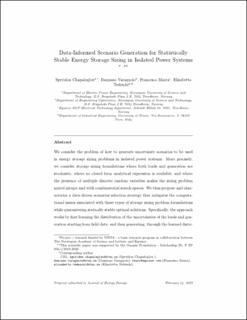| dc.description.abstract | We consider the problem of how to generate uncertainty scenarios to be used in energy storage sizing problems in isolated power systems. More precisely, we consider storage sizing formulations where both loads and generation are stochastic, where no closed form analytical expression is available, and where the presence of multiple discrete random variables makes the sizing problem mixed integer and with combinatorial search spaces. We thus propose and characterize a data-driven scenarios selection strategy that mitigates the computational issues associated with these types of storage sizing problem formulations while guaranteeing statically stable optimal solutions. Specifically, the approach works by first learning the distribution of the uncertainties of the loads and generation starting from field data, and then generating, through the learned distribution, an optimal set of uncertainty scenarios that are subsequently used in a two-stage stochastic programming reformulation of the original sizing problem. The workflow does not impose arbitrary structures to the correlation among the uncertainties, nor does it lump these in a single parameter; thus, it is suitable for systems with any load characteristics. Moreover, the approach ensures to reach a solution that is statistically close to the one that would be computed if the original problem was solvable and not computationally intractable. As a case study, we analyze the problem of designing an energy storage system for a wind powered oil and gas platform to minimize the expected daily system operational costs. Numerical simulations showed that the proposed methodology leads to higher quality solutions compared with other scenario selection strategies. This reveals realistic estimations of the expected benefits, while also highlighting the risk-management limitations, when solving the risk-constrained version of the problem. | en_US |

